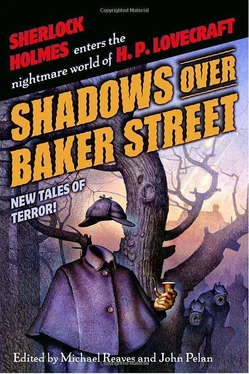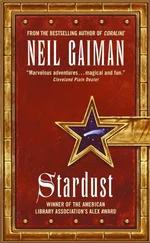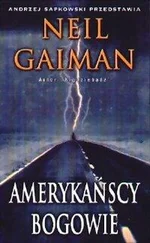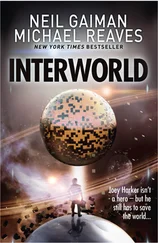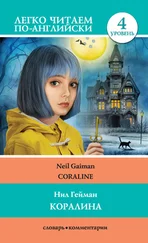In a little while I will enter the temple. I will conduct the solemn rites that I have painstakingly reconstructed from a thousand fragmentary ancient texts. Then we shall see what we shall see . . .
I am continuing to record my account of events on the phonographic device. I have raised the blind of the carriage as the train pulls into a rather ad hoc station built by the hydraulic engineers to serve the drainage site. The time is fourteen minutes past midnight. Now, what do I see before me? Some quarter of a mile away I spy in the moonlight the rolling silver of the North Sea. Between ocean and land is a rampart of earth and rocks that has been raised by the navvies to sever the lagoon from the tides. The lagoon, you will recall, was formed quite recently when the village of Burnston was engulfed during a storm. I see men toiling by the light of hurricane lamps. Horses drawing carts mounded with yellow gravel to renew the roadway. Sparks rising from the chimneys of steam engines that drive pumps to expel seawater from the inundated village.
Of the village itself, I see houses without roofs. Loathsome mud still oozes across streets to the height of the windows. There’s the village inn, the Mermaid, with its sign still festooned with seaweed. And here is the church of St. Lawrence, covered with a white leprous rash of barnacles. It is in this location that Father Buchanan uncovered a pagan temple beneath the nave. Carved there on the walls are symbols that evoke the Nameless One. In a few moments I shall leave the carriage to conduct a momentous ritual within the ancient temple. With that I shall access power of unimaginable—ah, it is Cowley again; here to interrupt my soliloquy. His face is as purple as a beet.
“Cowley, can you not see I am making a phonograph recording?”
“I beg your pardon, Professor.”
“Go on.”
“Those individuals that the navvies found in the houses . . .”
“Oh yes, pixies for the pixilated, no wonder.”
“No, Professor. These individuals are attacking the navvies.”
“Ridiculous.”
“They are devouring the men!”
“Away with you, man.”
“No, Professor, sir. Can’t you hear the screams? The men are being eaten alive. I’ve seen it myself. Their attackers are grotesque . . . monstrously deformed.”
“Shhh. There, perhaps the phonograph can record those sounds. Yes, Cowley, you’re not wrong. I can hear screams. Fascinating. You say that people who are deformed in some way inhabit the houses?”
“Worse than deformed, Professor. I’m a medical man and yet I’ve seen nothing like this. These individuals suffer from some condition that endows them with skin much like that of a fish. They have no eyelids, and possess vast eyes that are perfectly round. They make one nauseated if one looks upon them.”
“How intriguing.”
“Professor, we must leave at once.”
“No. We will not retreat. You have your revolver?”
“Yes.”
“Then guard the door, man. I will observe events as they unfold from the carriage.”
“But—”
“Do as I order, man.”
“Yes, sir.”
Now I will continue my observations. Indeed, I see any number of figures emerging from the houses . . . more accurately they slither like seals from the windows; squirming on their bellies across the silt before standing upright. My workmen appear no match for the creatures. The men are being killed and devoured as I watch. And how unusual the gait of these creatures: they move in a queer, swaying way, as if unfamiliar with moving on dry land. The battle is almost over. Now perhaps fifty of the creatures approach the carriage. They make gestures with their limbs—to call them arms would be misleading—there is something tentacular about them. The creatures’ heads are rounded, domelike; their eyes resemble those of a cod. Large and round and black. They do not blink. Yes, this moonlight is bright enough to appreciate more detail than perhaps one would wish. Initially, I thought they would attack, but now they have paused some thirty paces from the carriage. They look at me. Perhaps, by some clairvoyant process, they recognize my identity. Perhaps they know I am a friend and ally?
Now they move their limbs again. I see it is a priestly gesture . . . and what’s that? I hear voices . . . hissing voices: reminiscent of the exhalation of air from a dolphin’s blowhole. There, perhaps this instrument is sensitive enough to pick up the chorus of voices . . .
“Fhe’pnglai, Fhe’glinguli, thabaite yibtsill, Iä Yog-Sothoth, Cthulhu . . .”
An incantation. I recognize it from my translation of the Necronomicon . This indeed is a fabulous sight. Unique. An epoch-making event. This should— tut-tut . . . another interruption.
“You’re the engineer. Hatherley?”
“Yes, sir, I came to warn that—”
“Sit down there, man, and silence please. Can’t you see what I am doing?”
Ah, to continue . . . now, a brilliant flash of light. The creatures are evoking that alien power. My God, my good God . . . this will be at my disposal, too. Am I, also, to become the destroyer of worlds?
Ah, but I am quite dazzled by the light. And strange . . . Strange . I don’t hear the sound of the locomotive, but we seem to be in motion . . . there . . . I’ve managed to draw shut the carriage’s window blind, but I am still quite dazzled by that burst of incandescence . . . most peculiar; the train is moving, yet impossibly it feels as if we’re descending. At an incredible rate of speed, too. Those denizens of Burnston must have cast some ineffably exotic and occult influence upon the vehicle.
“Dr. Cowley.”
“Yes, Professor?”
“Don’t sound so frightened, man. With my presence here, you cannot be harmed.”
“But . . . we’re falling. What have they—”
“Hush now. Compose yourself.”
“I’m sorry, sir.”
“Now go to the window. Look out without disturbing the blind more than you can help it. Describe what you see outside.”
“Outside, sir?”
“Yes, man, and quickly. I’d do it myself, but the flash of light has left me dazzled. There . . . are you at the window yet, Dr. Cowley?”
“Yes, sir.”
“Peep through the gap in the blind as you would spy through a keyhole. On no account open it.”
“I understand.”
“Mr. Hatherley, remain in that seat. Do not attempt to look out of the window. On no account touch the blinds.”
“I understand, sir.”
“Excellent. Now, Dr. Cowley, describe exactly what you see.”
“Professor . . . oh, my dear God, we’re falling . . . We’re falling!”
“Describe exactly what you witness. The phonograph must record every single word.”
“We’re falling into what appears to be a pit, yet I can see stars embedded in its walls. Entire constellations of fabulous complexity. Beneath us are strange lights and patterns; geometric shapes. Weird shapes. I find it disturbing to gaze upon them . . . wait . . . I see now. It’s as if the train has drawn up to the very edge of a cliff of enormous height. I’m looking down upon lakes and canals and cities and oceans. We are plunging toward a city that contains a huge purple mountain in its center. The crash will smash us all to pieces.”
“It won’t, Cowley. We are slowing. We will gently alight in the citadel. Now, describe .”
“I see fabulous things . . . fabulous . . . but frightening . . . as if these are visions induced by an opiate.”
“Describe what you see. Delineate. Give me details. Colors. Shapes. Metaphor and simile, if you must.”
“It is an exotic city, like something from a dream. It is how I imagined the appearance of Byzantium. We pass through rose-colored mist. I see houses stacked terrace on terrace, one above the other, as they march up toward the mountain of purple. Myriads of chimneys expel fragrant smoke that drifts on star winds. I see ships with golden sails on oceans of emerald. I see towers of ivory reaching to the sky, I see dome on dome on dome stretching into infinity. I see bronze bells the size of battleships set into arches. The bells swing back and forth, ringing out fabulous notes that shimmer with an alien resonance across the city. Bell peals that will never change and never decay so long as the cosmos shall retain its cohesion. Through chinks in the window frame I smell the most beautifully exotic traces of incense. Spices, too, from kitchens that were old when the pyramids were new. I hear unearthly music. Magic fluting. Drums beating. I hear singing in the streets. Songs of ineffable beauty. Melodies of numinous power.”
Читать дальше
